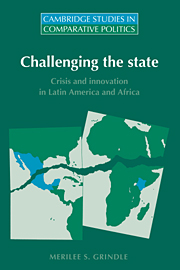Book contents
- Frontmatter
- Contents
- List of figures
- List of tables
- Acknowledgments
- 1 Challenging the state: a decade of crisis
- 2 Crisis and the state: evidence from Latin America and Africa
- 3 Crisis and breakdown in Mexico and Kenya
- 4 Imposing state authority
- 5 Managing the economy
- 6 Administering the public good
- 7 Responding to society
- 8 States of change
- Notes
- References
- Index
2 - Crisis and the state: evidence from Latin America and Africa
Published online by Cambridge University Press: 27 August 2009
- Frontmatter
- Contents
- List of figures
- List of tables
- Acknowledgments
- 1 Challenging the state: a decade of crisis
- 2 Crisis and the state: evidence from Latin America and Africa
- 3 Crisis and breakdown in Mexico and Kenya
- 4 Imposing state authority
- 5 Managing the economy
- 6 Administering the public good
- 7 Responding to society
- 8 States of change
- Notes
- References
- Index
Summary
The 1980s and 1990s witnessed economic and political crises of historic significance in Latin America and Africa. Throughout both regions, economies that were already fragile were almost destroyed by debt, inflation, low commodity prices, high interest rates, and devastating natural disasters. Political systems faced grave challenges to their right to govern societies that were themselves torn by division and unrest. Regime changes, civil wars, civic protest, and demands for human rights and accountable public officials characterized the political history of this era. The evidence is extensive and unambiguous: economic and political distress were hallmarks of an unsettled and unsettling era. Repeatedly, crisis exposed the weakness of existing state capacities to manage economic and political relationships.
This chapter uses data from sixteen countries in Latin America and Africa to explore the scope, nature, and implications of economic and political crisis. It addresses four questions. First, what was the scope of the dual crises of economic and political development facing countries in these regions? Second, what factors explain the nature of the problems that confronted a wide range of governments? Third, what impact did economic and political collapse or near collapse have on various dimensions of state capacity? Finally, what consequences did crisis have for state–economy and state–society relationships? Subsequent chapters deal in greater detail with the same issues in Mexico and Kenya; this chapter indicates the extent to which these two countries shared in region-wide political and economic trends.
- Type
- Chapter
- Information
- Challenging the StateCrisis and Innovation in Latin America and Africa, pp. 18 - 46Publisher: Cambridge University PressPrint publication year: 1996

